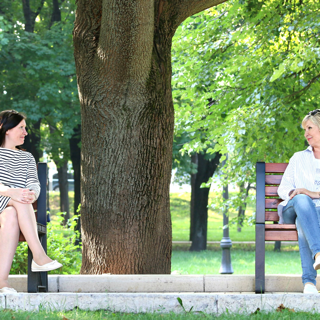For those of us struggling with a chronic condition, “How are you?” is a loaded and complicated question. First off, let me say that we know it is asked either out of common courtesy or genuine concern – usually with the best intentions. But despite that it often throws us into a mental whirlwind.
Should I tell her how I really am or just say I’m fine and move on? Does she really want to know? Should I burden him with my pain? How long has it been since I “complained” to him? I want to be honest, but I really don’t feel like talking about it. Is honesty even appropriate in this setting?
If you have a friend suffering with something, here are my tips for helping her with this interaction.
1) Don’t use “How are you?” as a cursory, rhetorical greeting. “Great to see you,” “Glad you’re here,” or even something like “What’s up?” are easier to respond to.
2) If you really want to know how she is, give her a signal – either in body language or words, that you’re not rushed and you have time to listen. I have a brother that often says something like, “Tell me how you’ve been doing for the past couple weeks.” That question carries assurance that he really wants to know – whether it’s good or bad.
3) Be sensitive to the fact that even if you’re open and interested, she may not want to talk about it right now. If you sense hesitation or pain after showing genuine concern, give her an out. “It’s fine if you don’t want to talk about it right now. Can I text you tomorrow and see how you are?”
4) Understand that if you show genuine concern and become a safe place for a true report, it may be a long time before you get a positive one. When I was going through the worst of my depression, I was either in a daze, unhappy, or devastated for a year and a half. I didn’t open up to most people, but the friends who were there for me got a LOT of bad reports and tears before it got better – and I will always thank God for their patient, generous hearts.
If you are a sufferer trying to answer that dreaded question, keep in mind that:
1) Although it’s sometimes hard to know if the person asking genuinely wants to know, there are some situations where you don’t have to think about it. If you’re meeting someone for the first time, or it’s a formal or business situation, don’t give it a second thought. Give the pat answer and move on.
2) If you don’t want to talk about it, you don’t have to. Keep some answers in your back pocket that are honest but move the conversation on, like “I’m makin’ it! How are you?”
3) Usually if you stay tuned into body language, you can tell pretty quickly if someone really wants to listen – even if you can’t tell in the first 15 seconds. I tend to give people the benefit of the doubt these days, and assume if they asked I can be honest. But if they start turning away or look uncomfortable, I change the subject.
4) A lot of our discomfort comes from fear of being judged. We don’t want people to think we’re wimpy or complaining or weak. That is not a healthy place from which to have a conversation. I try to remember that I am not responsible for other people’s perceptions or reactions, all I can do is go out into the world and pursue relationships with an open heart. That means I probably make some people uncomfortable with my openness. But I also make a lot of friends. As I have gotten more comfortable in my own skin, people have gotten less judgmental. Or, put another way, it was probably me and not them all along :)
